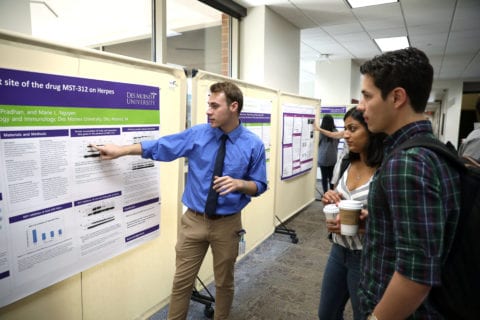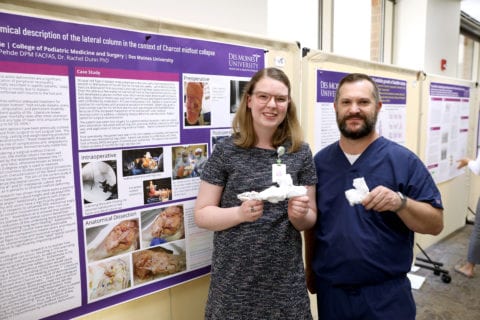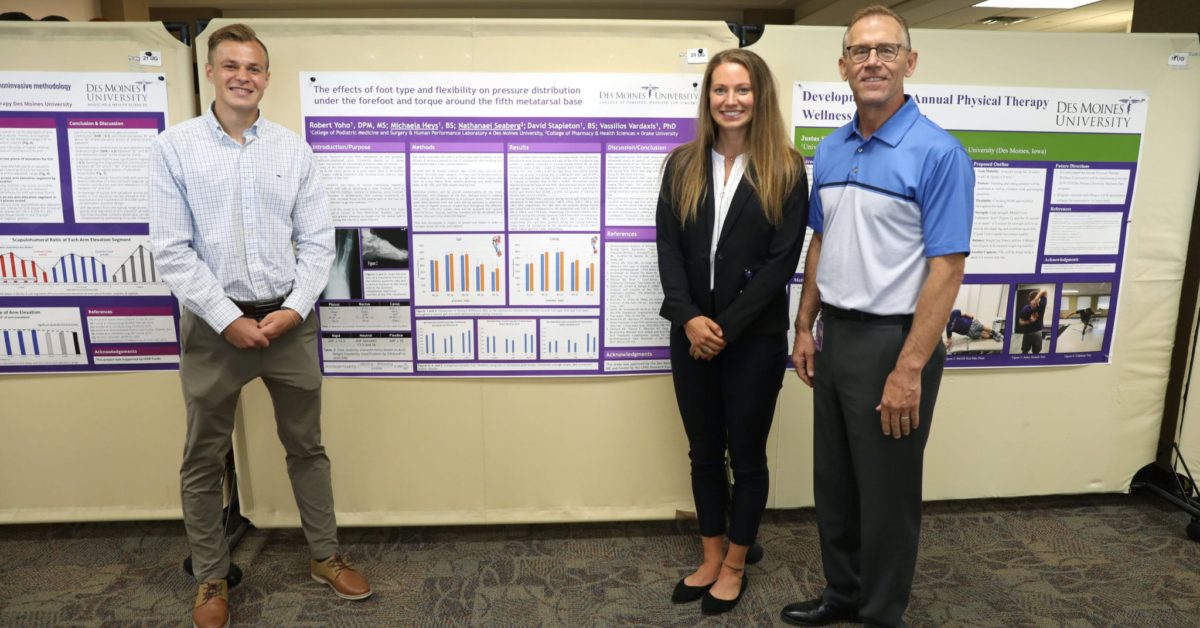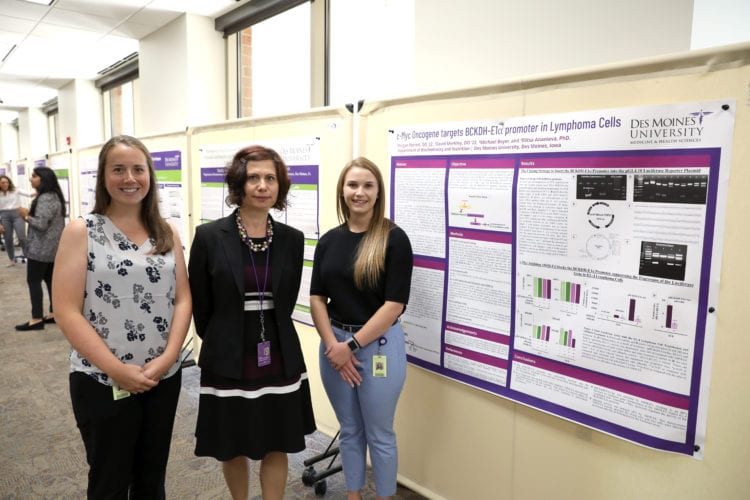From disparities in cancer screenings to the complication dynamics of type 2 diabetes, from genetic factors involved in adult obesity to the effect of an app that allows pregnant mothers to track their babies’ kicks, the finale of the DMU Mentored Student Research Program (MSRP) in July was a veritable buffet of knowledge in anatomy, paleontology, biomedical science, clinical topics, movement science and public health.

The eight-week summer program allows DMU students and undergraduate students to work alongside University faculty on research projects. The finale features oral and poster presentations by MSRP participants as well as a keynote speaker.
“For DMU students, the program provides a unique opportunity to gain additional skills and hold advanced discussions on topics relevant to their chosen profession. The experience can serve as a supplement for classroom learning or provide a gateway to advanced professional training,” says Katie Stevermer, M.P.T., GCS, Ph.D., D.P.T., an associate professor of physical therapy who has mentored students in the program for the past eight years. “For clinical students, the experience allows them to improve their ability to consider evidence for implementation in practice and may enhance their resume for employment or residency considerations.”
This year, Dr. Stevermer supervised an Iowa State University student, Cortney Elkin, on a clinical outcomes project focused on activity limitations and fall risk for individuals with peripheral neuropathy. She also guided Justus Sherman, who will become a member of DMU’s physical therapy Class of 2022 in August, in developing an annual physical therapy wellness exam to prevent musculoskeletal injuries and potentially identify balance issues among adults.
“Often for students entering the health professions, few have experience with human subjects research,” she says. “Therefore, I think it is valuable to involve them in clinically related research whenever possible. I also believe that for implementing research in clinical practice, it is more effective to involve future and current clinicians in the research practice.”

That opportunity convinced Collin Pehde, D.P.M., FACFAS, an assistant professor in DMU’s College of Podiatric Medicine and Surgery (CPMS), to become an MSRP mentor for the first time this summer.
“I have a lot of ideas that I couldn’t pursue in private practice. There are other faculty here who can help me, and a lot of students are interested in research who are very bright,” he says. “The program is a unique and stimulating opportunity to take advantages of the research office and other resources here.”
That was the case for one of the students Dr. Pehde mentored in the program. Amar Alkhafaji, D.P.M.’22, studied the effect of remote ischemic conditioning – the application of brief, reversible episodes of restricting blood flow to tissues – on the healing of diabetic foot ulcers. In addition to working with Dr. Pehde and James Mahoney, D.P.M., FACFAS, a CPMS professor, he reached out to Eric Wauson, Ph.D., and Noah Marcus, Ph.D., assistant professors in physiology and pharmacology.
“Throughout our research process, we wanted to use all the resources available at Des Moines University. Because our study involves a deeper understanding of physiology, we recruited the help of Drs. Wauson and Marcus, who have experience in research methods involving physiology,” Amar says. “They were extremely receptive and assisted us in identifying biomarkers to associate our intervention with diabetic foot ulcer healing.”
He also tapped the expertise of Chunfa Jie, Ph.D., a biostatistician in DMU’s biochemistry and nutrition department, to help design a pilot study that would be statistically significant and use resources the most efficiently.
“I would define our collaborative experience as using DMU to the fullest,” Amar says. “As a medical school, DMU offers a wide variety of experts in their field actively involved in academics. Our goal was to utilize this wealth of expertise to help our future patients.”
That was among the goals of MSRP participant Michaela Heys, D.P.M.’22, who along with Drake University student Nathanael Seaberg explored how different foot types may put a person more at risk of a Jones fracture, or fracture to the fifth metatarsal of the foot. They placed 78 reflective markers on the feet of 30 male and 30 female research subjects to evaluate their kinematics, kinetics and pressure distribution under the foot while walking.

“I love this project because it directly relates to my future career as a podiatrist,” Michaela says. “It is not only giving me the chance to work toward the prevention and healing of a very prevalent injury in my field, but it also allows me to deepen my knowledge about the feet as well as give me great hands-on experience working with research subjects.”
That represents “mission accomplished” for Elitsa Ananieva, Ph.D., an assistant professor of biochemistry and nutrition at DMU who supervises MSRP students every year. This summer, her students’ research focused on how major metabolic regulators, such as the energy sensor AMPK and the sterol regulatory proteins 1 and 2 (SREBP) control the metabolism of the essential amino acid leucine in lymphoma cells. One theory is that blocking leucine metabolism by the pharmacological inhibitors of AMPK and SREBP may prove useful in reducing cancer growth.

“I have always been passionate about engaging students in research. Offering research opportunities to students is a way to actively engage them in the scientific process of discovery and greatly complements their course work,” Dr. Ananieva says. “This is a great opportunity for students to not only learn research techniques but to also lead independent projects as well as work in a team environment.
“Faculty also benefit, for this program is a way to recruit students who can continuously work with the faculty for an entire calendar year,” she adds. “Overall, the existence of the MSRP program at DMU strengthens the reputation of DMU as an institution that engages both students and faculty in high-quality research.”

